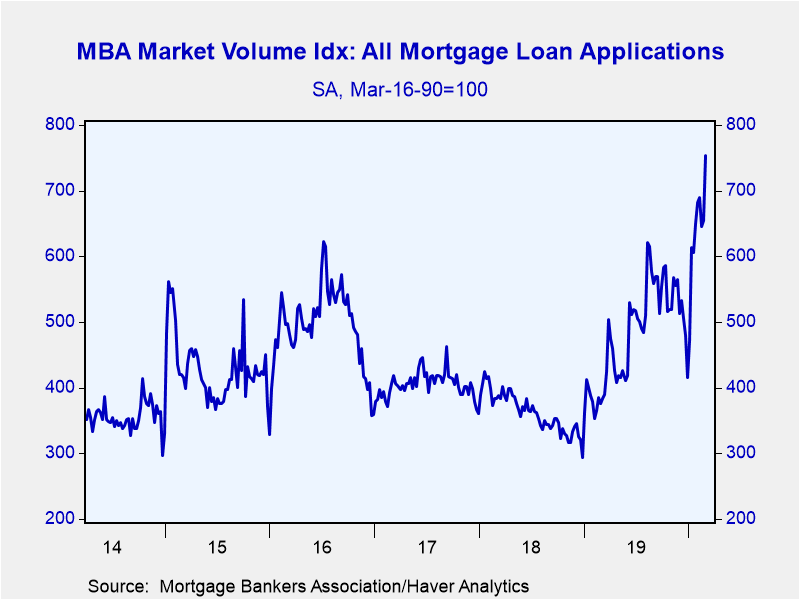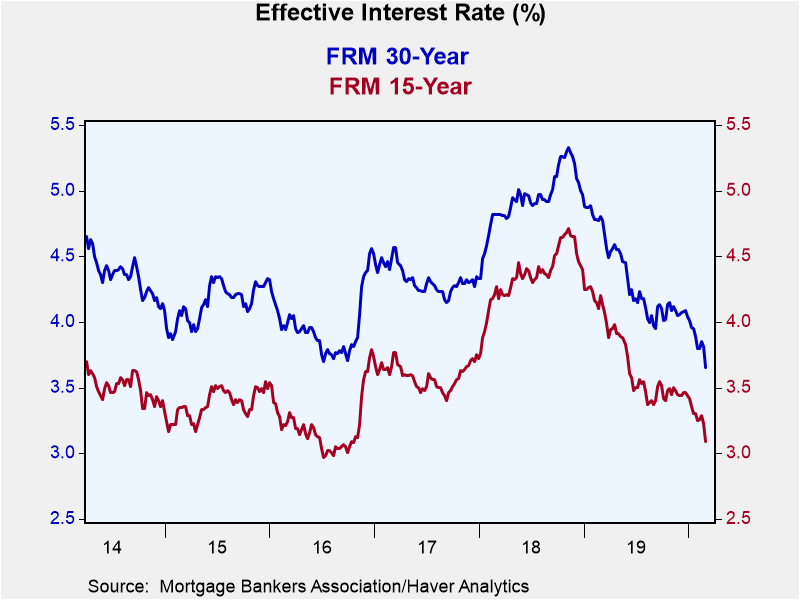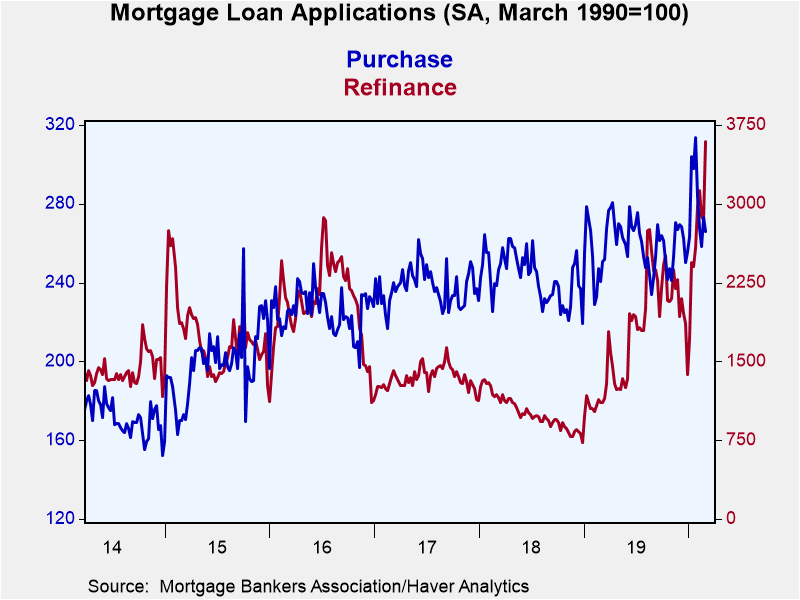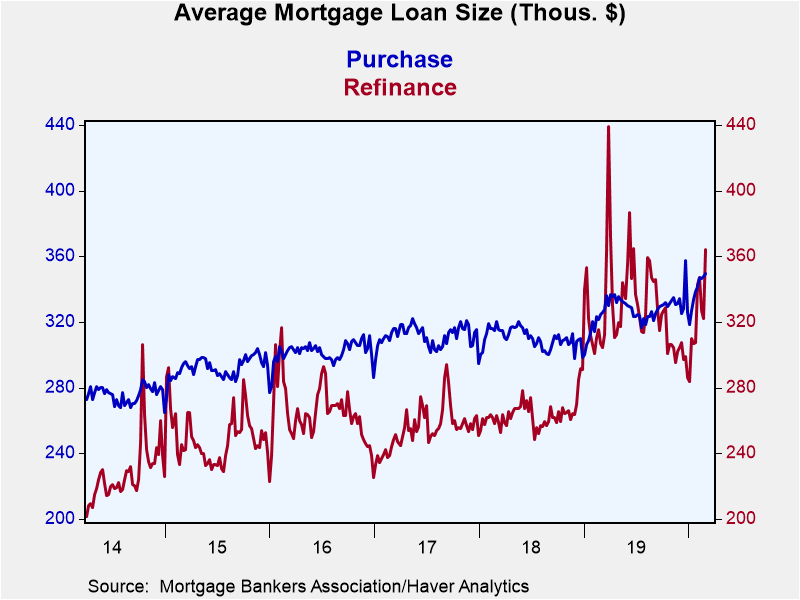 Global| Mar 04 2020
Global| Mar 04 2020U.S. Mortgage Applications Increase More with Still Lower Rates
Summary
The Mortgage Bankers Association reported that its Mortgage Loan Application Index rose 15.1% during the week ending February 28; this was just over double the year-ago amount, that is, up 100.9%; the previous week had seen a 1.5% [...]
The Mortgage Bankers Association reported that its Mortgage Loan Application Index rose 15.1% during the week ending February 28; this was just over double the year-ago amount, that is, up 100.9%; the previous week had seen a 1.5% weekly increase. The gain came in refinancings, up 26.0% in the week, making a y/y surge of 223.6%; the prior week had seen a week-to-week decrease of 0.8%. Purchase applications actually declined 2.7% in the week, but this still meant a 10.5% y/y increase; the February 21 week had seen a 5.7% increase.
The effective interest rate on a 15-year fixed rate mortgage fell to 3.09% in the February 28 week from 3.23% the week before. The rate thus remained well below its recent peak of 4.71% in early November 2018 and was the lowest since October 2016. The effective interest rate on the 30-year fixed rate mortgage fell to 3.65% from 3.81% the previous week. The effective rate on a 30-year Jumbo mortgage was down 10 basis points to 3.69%, and that on the 5-year adjustable rate mortgage fell to 3.17% from 3.31%.
The average mortgage loan size rose to $359,300 last week from $332,100 the previous week. The latest amount was the largest since March 29, 2019, which was $381,700. Again, the gain here was in refinancings, which averaged $364,300, noticeably more than the previous week’s $322,000. The average loan size for purchases was $349,400, up slightly from the prior week’s $347,800.
Applications for fixed-rate loans were almost double their year-ago amount, while applications for adjustable rate loans were up almost 70%.
The survey covers over 75% of all U.S. retail residential mortgage applications and has been conducted weekly since 1990. Respondents include mortgage bankers, commercial banks and thrifts. The base period and value for each index is March 16, 1990=100. The figures for weekly mortgage applications and interest rates are available in Haver's SURVEYW database.
| MBA Mortgage Applications (%, SA) | 02/28/20 | 02/21/20 | 02/14/20 | Y/Y | 2019 | 2018 | 2017 |
|---|---|---|---|---|---|---|---|
| Total Market Index | 15.1 | 1.5 | -6.4 | 100.9 | 32.4 | -10.4 | -17.8 |
| Purchase | -2.7 | 5.7 | -3.4 | 10.5 | 6.6 | 2.1 | 5.6 |
| Refinancing | 26.0 | -0.8 | -8.0 | 223.6 | 71.1 | -24.3 | -34.0 |
| 15-Year Effective Mortgage Interest Rate (%) | 3.09 | 3.23 | 3.29 | 4.16 (Feb.'19) | 3.71 | 4.35 | 3.59 |
| 30-Year Effective Mortgage Interest Rate (%) | 3.65 | 3.81 | 3.85 | 4.79 (Feb.'19) | 4.34 | 4.94 | 4.32 |
Carol Stone, CBE
AuthorMore in Author Profile »Carol Stone, CBE came to Haver Analytics in 2003 following more than 35 years as a financial market economist at major Wall Street financial institutions, most especially Merrill Lynch and Nomura Securities. She had broad experience in analysis and forecasting of flow-of-funds accounts, the federal budget and Federal Reserve operations. At Nomura Securities, among other duties, she developed various indicator forecasting tools and edited a daily global publication produced in London and New York for readers in Tokyo. At Haver Analytics, Carol was a member of the Research Department, aiding database managers with research and documentation efforts, as well as posting commentary on select economic reports. In addition, she conducted Ways-of-the-World, a blog on economic issues for an Episcopal-Church-affiliated website, The Geranium Farm. During her career, Carol served as an officer of the Money Marketeers and the Downtown Economists Club. She had a PhD from NYU's Stern School of Business. She lived in Brooklyn, New York, and had a weekend home on Long Island.
More Economy in Brief
 Global| Feb 05 2026
Global| Feb 05 2026Charts of the Week: Balanced Policy, Resilient Data and AI Narratives
by:Andrew Cates









